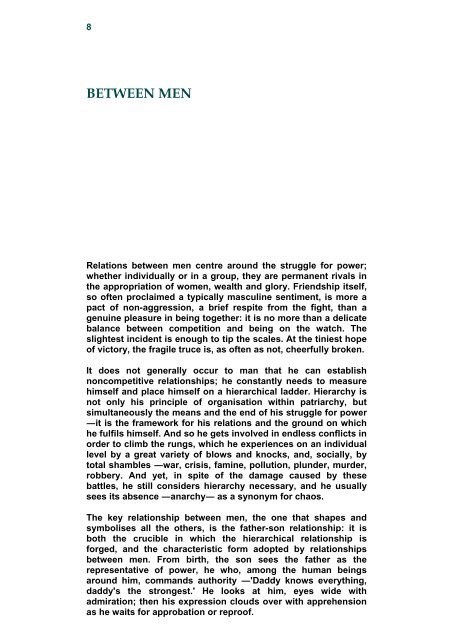emmanuel reynaud holy virility the social construction of masculinity
emmanuel reynaud holy virility the social construction of masculinity
emmanuel reynaud holy virility the social construction of masculinity
You also want an ePaper? Increase the reach of your titles
YUMPU automatically turns print PDFs into web optimized ePapers that Google loves.
8<br />
BETWEEN MEN<br />
Relations between men centre around <strong>the</strong> struggle for power;<br />
whe<strong>the</strong>r individually or in a group, <strong>the</strong>y are permanent rivals in<br />
<strong>the</strong> appropriation <strong>of</strong> women, wealth and glory. Friendship itself,<br />
so <strong>of</strong>ten proclaimed a typically masculine sentiment, is more a<br />
pact <strong>of</strong> non-aggression, a brief respite from <strong>the</strong> fight, than a<br />
genuine pleasure in being toge<strong>the</strong>r: it is no more than a delicate<br />
balance between competition and being on <strong>the</strong> watch. The<br />
slightest incident is enough to tip <strong>the</strong> scales. At <strong>the</strong> tiniest hope<br />
<strong>of</strong> victory, <strong>the</strong> fragile truce is, as <strong>of</strong>ten as not, cheerfully broken.<br />
It does not generally occur to man that he can establish<br />
noncompetitive relationships; he constantly needs to measure<br />
himself and place himself on a hierarchical ladder. Hierarchy is<br />
not only his principle <strong>of</strong> organisation within patriarchy, but<br />
simultaneously <strong>the</strong> means and <strong>the</strong> end <strong>of</strong> his struggle for power<br />
―it is <strong>the</strong> framework for his relations and <strong>the</strong> ground on which<br />
he fulfils himself. And so he gets involved in endless conflicts in<br />
order to climb <strong>the</strong> rungs, which he experiences on an individual<br />
level by a great variety <strong>of</strong> blows and knocks, and, <strong>social</strong>ly, by<br />
total shambles ―war, crisis, famine, pollution, plunder, murder,<br />
robbery. And yet, in spite <strong>of</strong> <strong>the</strong> damage caused by <strong>the</strong>se<br />
battles, he still considers hierarchy necessary, and he usually<br />
sees its absence ―anarchy― as a synonym for chaos.<br />
The key relationship between men, <strong>the</strong> one that shapes and<br />
symbolises all <strong>the</strong> o<strong>the</strong>rs, is <strong>the</strong> fa<strong>the</strong>r-son relationship: it is<br />
both <strong>the</strong> crucible in which <strong>the</strong> hierarchical relationship is<br />
forged, and <strong>the</strong> characteristic form adopted by relationships<br />
between men. From birth, <strong>the</strong> son sees <strong>the</strong> fa<strong>the</strong>r as <strong>the</strong><br />
representative <strong>of</strong> power, he who, among <strong>the</strong> human beings<br />
around him, commands authority ―'Daddy knows everything,<br />
daddy's <strong>the</strong> strongest.' He looks at him, eyes wide with<br />
admiration; <strong>the</strong>n his expression clouds over with apprehension<br />
as he waits for approbation or repro<strong>of</strong>.
















